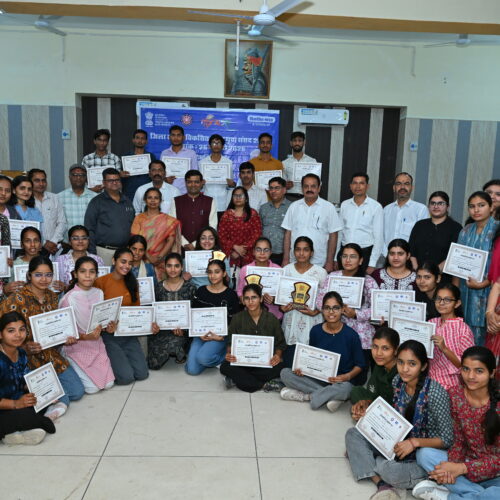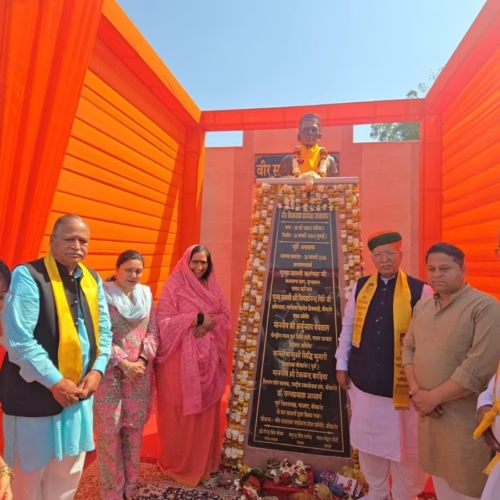Pakistani Army Chief Rekindles Two-Nation Theory, Sparks Diplomatic Storm with Remarks on Hindu-Muslim Divide
By: Defence Journalist Sahil
Islamabad/New Delhi, April 2025 – In a speech that has triggered diplomatic ripples across the subcontinent, Pakistan’s Chief of Army Staff General Asim Munir reignited the controversial Two-Nation Theory by asserting that “we [Muslims] are different from Hindus in every possible aspect of life.” His remarks have drawn strong reactions from India and the global community, raising concerns about regional stability and communal harmony.
Speaking at an official ceremony held at Pakistan Military Academy in Kakul, Munir said, “Our religion is different, our customs are different, our values are different – this was the foundation of the Two-Nation Theory, and that theory continues to guide our national identity.”
The Two-Nation Theory, first articulated by Allama Iqbal and later championed by Muhammad Ali Jinnah, led to the partition of British India in 1947, establishing Pakistan as a separate homeland for Muslims. However, Munir’s contemporary revival of this ideology in 2025 is being viewed as a setback to efforts aimed at improving India-Pakistan relations.
Strong Reactions from India
India’s Ministry of External Affairs (MEA) issued a firm statement condemning the comments. “Such statements not only distort historical facts but also endanger the path to peaceful coexistence and regional cooperation. India remains committed to secularism and the inclusive ethos enshrined in its Constitution,” read the MEA statement.
Several Indian political leaders, cutting across party lines, criticized Munir’s remarks. “These outdated ideologies have no place in a modern world striving for unity, peace, and tolerance,” said a senior Indian Parliamentarian.
Experts Warn of Growing Militarization of Ideology
Strategic analysts noted that Munir’s speech reflects the growing intertwining of religion with military doctrine in Pakistan. Experts say that instead of promoting reconciliation, such speeches reinforce hardline narratives within Pakistan’s power corridors.
“General Munir’s comments represent a deepening of ideological militarization in Pakistan. This is not just about history—it’s about the mindset being promoted within the armed forces,” said Dr. Kiran Deshmukh, a South Asia security expert.
Global Concerns Over Rising Religious Intolerance
Human rights organizations and diplomatic observers have also expressed worry over increasing religious polarization in the region. The United Nations Office on Genocide Prevention emphasized the need for regional leaders to promote tolerance and harmony.
“Religious differences should never be weaponized to deepen divisions between communities or nations,” said an official from Amnesty International.
A Shift or a Political Signal?
Analysts also believe Munir’s speech may be politically motivated, possibly aimed at influencing domestic audiences amid rising criticism over economic instability and governance issues in Pakistan.
Meanwhile, peace activists on both sides of the border have called for restraint and renewed efforts toward people-to-people diplomacy, cultural exchanges, and humanitarian cooperation.
पाकिस्तानी सेना प्रमुख जनरल मुनीर ने फिर जगाई ‘दो-राष्ट्र सिद्धांत’ की चिंगारी, हिन्दू-मुस्लिम विभाजन पर दिए बयान से बवाल
रिपोर्ट: डिफेंस जर्नलिस्ट साहिल
इस्लामाबाद/नई दिल्ली, अप्रैल 2025 – पाकिस्तान के सेना प्रमुख जनरल असीम मुनीर द्वारा ‘हम हर दृष्टि से हिन्दुओं से अलग हैं’ जैसे बयान ने एक बार फिर उपमहाद्वीप में सांप्रदायिक ध्रुवीकरण की बहस को तेज कर दिया है। इस बयान ने भारत-पाक संबंधों में नई दरार डाल दी है और अंतरराष्ट्रीय समुदाय में चिंता पैदा कर दी है।
मुनीर ने यह बयान पाकिस्तान मिलिट्री अकादमी, काकुल में आयोजित एक समारोह के दौरान दिया। उन्होंने कहा, “हमारा धर्म अलग है, हमारे रीति-रिवाज़ अलग हैं, हमारी जीवनशैली अलग है — यही दो-राष्ट्र सिद्धांत की नींव थी और यही आज भी हमारे राष्ट्रीय स्वभाव का आधार है।”
यह विचारधारा, जिसे सबसे पहले अल्लामा इक़बाल और फिर मोहम्मद अली जिन्ना ने आगे बढ़ाया, 1947 में भारत के विभाजन और पाकिस्तान की स्थापना का आधार बनी। लेकिन 2025 में इसका दोबारा उच्चारण भारत-पाक रिश्तों में तनाव को और गहरा करने वाला माना जा रहा है।
भारत ने दिया कड़ा जवाब
भारत के विदेश मंत्रालय ने इस बयान की कड़ी आलोचना करते हुए कहा, “ऐसे बयान न केवल ऐतिहासिक तथ्यों को तोड़-मरोड़ कर पेश करते हैं, बल्कि शांतिपूर्ण सह-अस्तित्व और क्षेत्रीय सहयोग की राह में भी बाधा हैं। भारत अपने संविधान में निहित धर्मनिरपेक्ष मूल्यों और समावेशी विचारधारा के प्रति प्रतिबद्ध है।”
भारतीय राजनीतिक दलों ने भी इस बयान की निंदा की है। एक वरिष्ठ सांसद ने कहा, “ऐसी पुरानी और बंटवारे की सोच रखने वाली विचारधाराओं का 21वीं सदी में कोई स्थान नहीं है।”
विशेषज्ञों की चेतावनी: विचारधारा का सैन्यीकरण
रक्षा विश्लेषकों का मानना है कि जनरल मुनीर का बयान पाकिस्तान की सेना में विचारधारात्मक कठोरता को दर्शाता है। वे कहते हैं कि यह विचार पाकिस्तान की सैन्य नीति में गहराई से समा रहा है।
दक्षिण एशिया मामलों की विशेषज्ञ डॉ. किरण देशमुख ने कहा, “यह बयान पाकिस्तान में विचारधारा और सैन्य शक्ति के खतरनाक मेल की ओर संकेत करता है। यह सिर्फ इतिहास की बात नहीं है, यह उस मानसिकता की बात है जिसे वहां की सेना में बढ़ावा दिया जा रहा है।”
धार्मिक असहिष्णुता पर अंतरराष्ट्रीय चिंता
संयुक्त राष्ट्र और अन्य मानवाधिकार संगठनों ने धार्मिक असहिष्णुता पर चिंता जताते हुए कहा है कि इस प्रकार के बयान क्षेत्र में सामाजिक सौहार्द्र को नुकसान पहुंचा सकते हैं।
एमनेस्टी इंटरनेशनल के एक अधिकारी ने कहा, “धार्मिक विविधता को हथियार बनाकर समुदायों और देशों के बीच दरार पैदा करना मानवाधिकारों के खिलाफ है।”
घरेलू राजनीति या रणनीतिक संकेत?
कुछ विश्लेषकों का मानना है कि पाकिस्तान में आर्थिक अस्थिरता और शासन संकट के बीच मुनीर का यह बयान घरेलू राजनीतिक दबाव से ध्यान हटाने की एक कोशिश हो सकती है।
इस बीच, दोनों देशों के शांति समर्थक संगठनों ने संयम बरतने और सांस्कृतिक संवाद तथा मानवीय सहयोग को बढ़ावा देने की अपील की है।













Add Comment